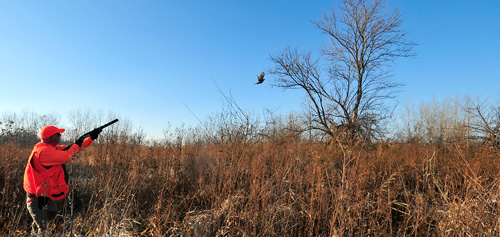

The Indiana Private Lands Access Program (IPLA – formerly known as APPLE) offers financial incentives to landowners who allow controlled public hunting access on their private property. This program is funded in part by the federal Farm Bill under the Voluntary Public Access and Habitat Incentive Program (VPA-HIP).
The program's focus is on providing hunting opportunities on private property across Indiana.
- All IPLA hunts are administered through the reserved hunt draw system.
Please be patient, as we are currently working with private landowners to add more properties to the program.
Not all counties within Indiana are eligible for IPLA; however, if you are a landowner interested in finding out more about the program or wishing to enroll your property, please call or email your local district biologist.
IPLA Rules for Hunters
- IPLA hunters must agree to adhere to the following IPLA rules:
- Follow all laws and obtain all necessary permits and licenses as outlined in the Indiana Hunting & Trapping Guide (including license requirements, bag limits, etc.).
- Abide by posted signage.
- Be responsible for any property damage they cause, including but not limited to fences, buildings, and other structures.
- Do not litter or leave any trash on the property.
- Portable tree stands/blinds may be used (fasteners and equipment holders that penetrate the tree more than a half-inch are prohibited). Portable tree stands/blinds must be legibly marked with the owner’s name, address, and telephone number. Information must be easily read from the ground. All tree stands / blinds must be removed by the end of the assigned hunt window.
- Park motor vehicles only in designated parking areas noted on the IPLA access area maps.
- Stay within the IPLA access boundaries.
*Hunting access is granted only for the game species you were selected for.
- IPLA hunters may not:
- Trap or set traps.
- Fish.
- Collect mushrooms, wild fruits, or nuts.
- Cut vegetation, trees, or firewood.
- Construct, place, or use permanent-type stands or blinds. Fasteners that penetrate a tree more than ½ inch are prohibited.
- Target-shoot.
- Set up camp.
- Build, use, set, or light a fire.
- Operate vehicles outside of the designated parking area.
- Place, expose, deposit, distribute, or scatter salt, mineral supplements, grain, fruit, vegetables, or other feed.
- Place or use trail cameras.
- Pursue or harvest additional game species that were not selected during the registration or draw process.
Answers to FAQs for HUNTERS
- Will I be the only hunter on the property?
This depends on the property. Some properties allow access for more than one hunter at a time.
- Do I need any special permits other than the appropriate hunting licenses to use enrolled properties?
Hunters must follow all laws and obtain all necessary permits and licenses as outlined in the Indiana Hunting & Trapping Guide (including license requirements, bag limits, etc.) for the species they are pursuing.
- Should deer and turkey harvested on IPLA properties be checked in as public or private lands?
All deer and turkey harvested on IPLA properties should be checked in using the CheckIN game system as private lands.
- How do I obtain permission to hunt an IPLA property?
- For all IPLA hunts, you must register using the reserved hunt draw system.
- If I see a property might be good for trapping, shed hunting, or any other activity that is not permitted through the IPLA program, is there a way to do those activities on enrolled properties?
Any activity not permitted in the IPLA rules listed would require separate written permission from the landowner. Landowners may give permission for additional activities at their discretion.
- Can I bring other hunting or non-hunting partners with me?
- For DEER hunting you may bring one additional non-hunting partner. Non-hunting partners can call, take photos, observe, help with equipment, etc. Partners who call for the hunter must have a license to participate.
- For GAME BIRD hunting you may bring up to two additional hunting partners.
- For TURKEY hunting you may bring one additional non-hunting partner. Non-hunting partners can call, take photos, observe, etc. Partners who call for the hunter must have a license to participate.
- For WATERFOWL hunting, you may bring up to three additional hunting partners.
- For SMALL GAME hunting, you may bring up to three additional hunting partners.
- Is this program open to Indiana residents only?
No, nonresidents may also apply for or sign in to IPLA hunts.
- Is this program funded with my license dollars?
Some hunts, specifically game bird hunts, are funded with money collected via the sales of Game Bird Habitat Stamps; however, the majority of IPLA hunts are funded through a grant as part of the 2018 US Farm Bill and are not funded using Indiana taxpayer or license dollars.
Answers to FAQs for LANDOWNERS
- Why should I enroll my property in IPLA?
Not only will you receive monetary compensation for allowing access, but each landowner will also be eligible for additional funds for habitat management. By enrolling in this program, you can provide much-needed access for hunters without the bother of hunters knocking on your door seeking permission.
- How much does the program pay for public hunting access?
Payments can range from $3 to $150 per acre, depending on which species you allow to be hunted on your property. Contact your local district biologist for more specific payment rates.
- Can I hunt my own property if I enroll it in IPLA?
Any property that is enrolled in IPLA may only be hunted by those hunters drawn or registered for the program. However, you may hunt for species that you did not enroll in the program, or you may hunt after the IPLA hunts are completed. For example, if you allow access to deer hunting on your property through IPLA, but not waterfowl hunting, you may hunt waterfowl but not deer. If you allow deer hunting only during the youth and archery season, you may hunt deer after the youth and archery season IPLA hunts are completed.
- Am I liable for any actions by IPLA hunters on my property?
No. Liability for all activities on IPLA tracts of property is covered under the State of Indiana Agrotourism Law (IC 34-31-9). In addition, each successfully drawn/registered hunter is required to sign a liability waiver before participating in an IPLA hunt.
- How long are IPLA contracts?
IPLA contracts are one year in length.
- How many hunters would be allowed on my property?
This is determined via a discussion between you and your local biologist. Biologists will work with each landowner to determine the number of people who could access the property based on several factors such as size of the property, number, and location of parking areas, number of hunters that could safely hunt the property, resource, and species concerns, and the number of hunters the landowner is generally comfortable allowing.
- Can I enroll only a portion of my property?
Yes. Access areas can be configured in a variety of ways according to your preferences. Landowners can enroll as many acres as they wish, including agricultural fields in some situations. Large lakes, ponds, lawns, or other obvious “non-huntable” areas will be subtracted from total acres.
- Am I restricted from farming any property enrolled?
No. Landowners my farm and perform any regular agricultural activities on their property.
- Can I implement additional rules for users of my property under the program?
Landowners cannot set any special rules for hunting-related activities. Landowners can set areas open or closed to access according to their preferences during the enrollment process (e.g., safety zones, no-hunting zones, etc.). Landowners can also designate access points where users park and access their property. As for hunting and user activities, the program has a uniform set of rules implemented statewide to make it easy and simple for hunters using enrolled properties.
- Can I pick and choose which wildlife species are hunted on the enrolled property?
Yes. Landowners are encouraged to work with their district biologist to determine which species they would like to allow access to on their property. Biologists will help determine which species are viable for hunting on each landowner’s property.
- What happens if someone isn’t following the rules of the IPLA program?
IPLA users who do not follow the rules may have their IPLA hunting privileges revoked, be denied future access to the program, and may face law enforcement action.
- Will I know how many people have accessed my property and how much game they have harvested?
Yes. All hunters must complete a virtual hunt card after their hunt to report what they did, saw, and harvested on every IPLA hunt. This data can be shared with the landowner at their request.
